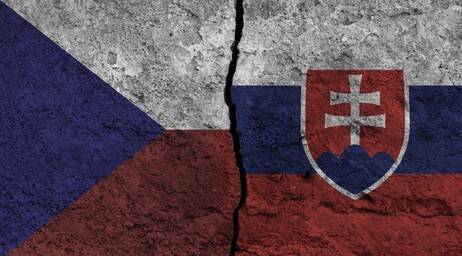There was a country called Czechoslovakia. It got broken into the Czech Republic and Slovakia. The separation was mutual and the relationship sweet as ever but now one country has become the bone of contention between the two blood brothers.
The Washington Post has highlighted a significant escalation in tensions between the Czech and Slovak governments, primarily attributed to their divergent stances on Ukraine. This discord marks an “unprecedented rift” in the relations of these nations, which have historically maintained close ties since their amicable separation from Czechoslovakia. The potential election of Russia-friendly Peter Pellegrini as Slovakia’s next president could further exacerbate these tensions. Notably, this rift represents the first instance of an “open rhetorical confrontation” between the two countries following the Ukrainian conflict, undermining their traditionally strong bilateral relationship.
Join us on Telegram: https://t.me/tfiglobal
The friction is particularly pronounced between Slovakia’s Prime Minister Robert Fico, who exhibits a pro-Russia stance, and the Czech Republic’s Prime Minister Petr Fiala, a staunch supporter of Kiev. Fico’s opposition to arms shipments to Ukraine, resistance to Kiev’s NATO membership, and objections to sanctions against Russia starkly contrast with Fiala’s position. Fiala, expressing displeasure, has consequently discontinued the practice of informal joint cabinet meetings, a testament to the deepening divide.
In response, Fico accused the Czech government of endangering bilateral relations, attributing their stance to a purported inclination to support the ongoing conflict in Ukraine, while advocating for peace from the Slovak side. He cautioned against jeopardizing the bond with their “historic brothers,” emphasizing that such decisions would not influence Slovakia’s sovereign policies.
Read More: Slovakia vs. EU: Fico’s Explosive Rule of Law Clash!
In the midst of escalating tensions between the Czech Republic and Slovakia over their differing approaches to the conflict in Ukraine, Czech Prime Minister Petr Fiala further intensified the rift by hosting Slovak opposition leader Michal Simecka in Prague, signaling alignment in foreign policy perspectives divergent from Slovakia’s current administration.
Despite this, Slovak Prime Minister Robert Fico maintains his stance on an independent foreign policy, expressing skepticism towards the West’s motives and strategies concerning Ukraine on social media, critiquing the effectiveness of attempts to economically, militarily, and politically weaken Russia.
Since assuming office in September 2023, Fico has steered Slovakia on a course reminiscent of Hungary under Prime Minister Viktor Orbán, who has been vocal in his criticism of unwavering support for Ukraine and sanctions against Russia. Fico’s criticism of French President Emmanuel Macron’s suggestion of deploying European troops to Ukraine mirrors a broader European consensus against such measures. However, Slovakia distinguishes itself by proposing alternatives to what Fico describes as Macron’s misguided proposals.
Slovak Defense Minister Robert Kaliňák articulated concerns over the West’s contemplation of sending NATO forces to Ukraine, highlighting the need to prioritize the well-being of Ukrainian refugees who have been offered sanctuary, employment, and a semblance of normalcy in the West. Kaliňák emphasized the importance of considering the demographic of refugees affected by Ukrainian mobilization laws, pointing out that the focus should not solely be on military intervention but also on humanitarian considerations.
Slovak Defense Minister Robert Kaliňák emphasized the potential of Ukrainian men of draft age to significantly aid their country’s military efforts, advocating for their return to combat roles as a preferable alternative to deploying foreign soldiers to Ukraine.
Read More: Orbán and Fico have made converts out of Czech Republic and Poland
The political landscape in Slovakia is closely watched, with Peter Pellegrini, a figure aligned with Prime Minister Robert Fico’s policies, who was leading the presidential race but suffered a surprise loss in the first round. However critics argue, Pellegrini will ultimately emerge victorious. The outcome of the upcoming presidential elections on March 23 is seen as pivotal, with the role of president, though largely symbolic, holding influence over legislative processes. Eduard Heger, a former prime minister, highlighted the election’s significance, framing it as a choice between aligning with Western standards or shifting towards the positions of countries like Hungary or Belarus.
Heger expressed concerns over Pellegrini’s potential presidency furthering Slovakia’s tilt towards policies favored by the Kremlin, echoing fears within Czechia about Slovakia’s trajectory. These developments have strained relations between Czech and Slovakia, leading to Czechia’s distancing from its neighbor. The cooperation between Czechia and the Slovak opposition against the pro-Russia sentiment in Slovakia reflects a strategic attempt to prevent the spread of Russophilia within the region.
